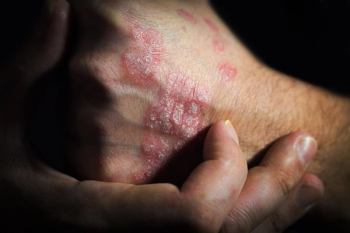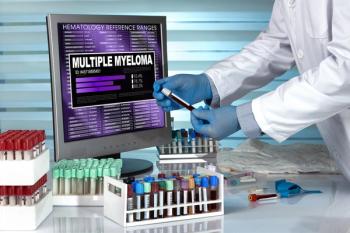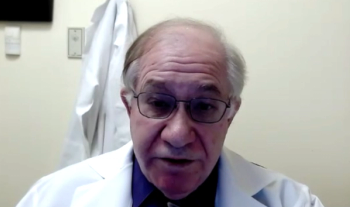
Patients with low psoriasis body surface area (BSA) can have similar quality of life impacts and symptom burdens as those with higher BSA, a new study finds.

Patients with low psoriasis body surface area (BSA) can have similar quality of life impacts and symptom burdens as those with higher BSA, a new study finds.

Two posters presented at the 2025 European Hematology Association Congress support combination therapy with daratumumab, bortezomib, lenalidomide, and dexamethasone (DVRd) in transplant-ineligible or deferred newly diagnosed multiple myeloma.

Late-breaking data reveal durable improvements in joint, skin, and quality of life outcomes with deucravacitinib.

Constance Blunt, MD, medical oncologist, Mary Bird Perkins Cancer Center, discusses the potential consequences of losing free health care screening coverage.

Dirk Arnold, MD, PhD, medical director, Asklepios Tumour Biology Centre, discusses the trial design of a study comparing amivantamab with standard chemotherapy to potentially improve treatment outcomes.

Sodium reduction is key to lowering blood pressure in adults with type 2 diabetes, a study finds.

Amivantamab shows promise as a first-line treatment for metastatic colorectal cancer, potentially outperforming standard chemotherapy options.

Artificial intelligence (AI) provides a major tool in the evolution of thoracic care, as clinicians work to catch lung cancer earlier to provide better prognosis.

Adam Colborn, JD, associate vice president for congressional affairs, Academy of Managed Care Pharmacy (AMCP), shares updates on the Ensuring Community Access to Pharmacist Services (ECAPS) Act of 2025, which was introduced in the House of Representatives last month.

Leaders in oncology share why the American Society of Clinical Oncology (ASCO) meeting remains a top global gathering for breakthroughs, networking, and lifelong learning.

With potential lung cancer nodules sometimes slipping through the cracks, educating stakeholders about artificial intelligence (AI) that can catch nodules early could be helpful in cancer treatment.

Constance Blunt, MD, medical oncologist, Mary Bird Perkins Cancer Center, shares how one mobile health care initiative is addressing critical barriers to medical access for underserved populations.

A groundbreaking trial shows tumor-treating fields enhance survival and quality of life for patients with locally advanced pancreatic cancer.

US claims data show patients with generalized pustular psoriasis (GPP) face up to a 4-fold higher mortality risk compared with the general population.

Ponatinib shows promising results in achieving MRD negativity and improved event-free survival in Ph+ ALL patients compared to imatinib, according to ASCO findings.

A circulating tumor DNA (ctDNA) blood test demonstrated high sensitivity and specificity for colorectal cancer (CRC) detection in a large average-risk population, study finds.

Mild asthma could be better treated with the recent approval of the combination of albuterol/budesonide.

Developments in artificial intelligence (AI) can help clinicians to diagnose thoracic conditions that may be miss on first glance.

Dirk Arnold, MD, PhD, medical director, Asklepios Tumour Biology Centre, discusses a phase 3 clinical trial investigating amivantamab in metastatic colorectal cancer.

Jill Feldman, cofounder and president, EGFR Resisters, shares the importance of being proactive in managing dermatologic toxicities in epidermal growth factor receptor (EGFR)–positive lung cancer.

The value of the combination of albuterol/budesonide is high due to its alleviating of corticosteroid burden, according to Reynold Panettieri Jr, MD.

Danny Rischin, MD, medical oncologist, clinician researcher, Peter McCallum Cancer Centre, discusses a novel adjuvant treatment approach for patients with locally advanced cutaneous squamous cell carcinoma (CSCC).

The landscape of treatment for bronchiectasis could change significantly with the approval of brensocatib, offering a more direct method of stemming the adverse events related to the condition, explains James Chalmers, MD, University of Dundee.

Ibrahim Aldoss, MD, associate professor, City of Hope, explores recent findings on ponatinib as a first-line treatment for Philadelphia chromosome–positive acute lymphoblastic leukemia (Ph+ ALL).

Cemiplimab significantly enhances disease-free survival in high-risk cSCC patients, reducing recurrence and metastasis risks, according to findings presented at ASCO.

Different dosages of brensocatib proved effective in treating people living with bronchiectasis when studied in the ASPEN trial.

Vincent Picozzi, MD, medical oncologist and director of the Pancreaticobiliary Program at Virginia Mason, discusses findings from the PANOVA-3 trial, which represents a significant breakthrough in locally advanced pancreatic cancer (LA-PAC) treatment.

Manmeet Ahluwalia, MD, MBA, FASCO, chief of medical oncology, chief scientific officer, and deputy director of the Miami Cancer Institute of Baptist Health South Florida, discusses a groundbreaking clinical trial for non-small cell lung cancer (NSCLC) brain metastases.

Sanjay Goel, MD, MS, professor of medicine at Robert Wood Johnson Medical School and medical oncologist at Rutgers Cancer Institute, anticipates groundbreaking data at the American Society of Clinical Oncology (ASCO) 2025 meeting, with plenary sessions spotlighting research that could immediately impact cancer care.

The approval of brensocatib for use in patients with bronchiectasis could offer the first treatment directly addressing the roots of the condition.

259 Prospect Plains Rd, Bldg H
Cranbury, NJ 08512
© 2025 MJH Life Sciences®
All rights reserved.
